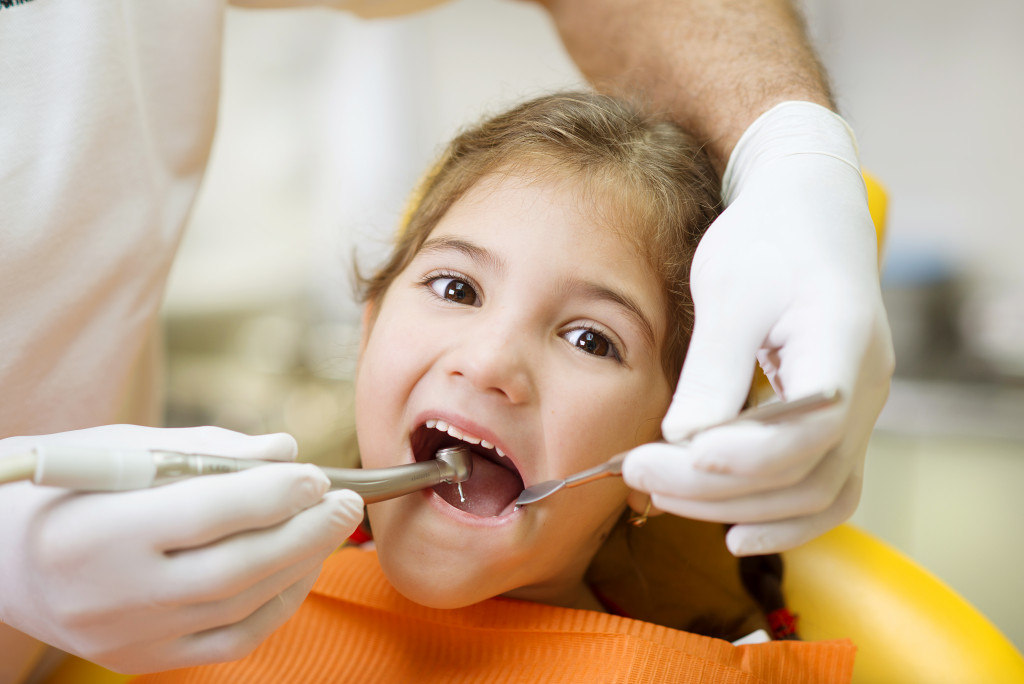- Model good oral hygiene habits in your home.
- Make sure kids get enough sleep and eat a balanced diet.
- Teach proper brushing and flossing techniques.
- Encourage regular dental visits for the entire family.
- Invest in quality toothbrushes and toothpaste for everyone.
Good oral health is vital to your family’s overall well-being and starts with you. Encouraging positive habits in your home and teaching your kids healthy practices can go a long way. Here are five tips for instilling good oral health in your family.
1. Model Good Habits for Your Kids
The best way to get kids to develop healthy habits is by example. This will ensure that your kids understand the importance of maintaining good oral care.
Here are some practical good habits you can model for their oral health:
Eat a Balanced Diet
Children must consume a balanced diet for optimal health, including oral health. Ensure your children have plenty of fresh fruits and vegetables, whole grains, low-fat dairy products, lean proteins, and healthy snacks throughout the day. Avoiding sweet drinks such as sodas and juices is also important for cavity prevention. Show your kids that eating healthy food pays off with healthier teeth!
Promote Healthy Sleep Patterns
Good sleep habits are essential for overall health and well-being. Make sure your children get plenty of restful sleep each night, as this helps to recharge their bodies and minds. The American Academy of Sleep Medicine recommends that school-age children should get between 9-12 hours of sleep every night.
Teach Proper Brushing Techniques
Teach your children how to brush correctly, as they may not understand the importance of this yet. Start by brushing your own teeth first, then demonstrate to them the proper way to do it — start at the gum line and move in gentle circles until all surfaces of each tooth have been cleaned and rinsed thoroughly. Make sure they understand the importance of brushing twice a day, every day.
Prevent Injury or Accidents
Kids can be accident-prone, so taking extra precautions when engaging in sports or physical activities that may cause facial trauma is essential. Have them wear a mouthguard if they play contact sports like hockey or soccer, and allow plenty of time for rest if they experience any kind of injury to the face or jaw.
2. Instill the Importance of Regular Dental Visits

Regular dental visits should be encouraged for all members of the family. Teeth need to be checked twice a year, as this helps prevent problems from going undetected. During these appointments, your skilled dentist can spot early signs of decay or disease and treat them before they become more serious issues. Additionally, regular cleanings and fillings will help keep your family’s teeth healthy and strong.
Furthermore, regular checkups are great for building trust between the dentist and patient; this is especially important for children who may be developing a fear of visiting dentists due to the associated discomfort. With consistent dental visits, your children can learn to feel more comfortable with the process and actually look forward to their visits. Additionally, preventative dentistry can often reduce or even eliminate the need for more serious treatments in the future.
3. Invest in Quality Toothbrushes and Toothpaste
Investing in quality toothbrushes and toothpaste for oral health care is essential. Choose soft bristles for all family members, as hard bristles can damage teeth and gums. When it comes to toothpaste, opt for ones that contain fluoride and are labeled “anti-cavity.” These will help protect your family’s teeth by preventing cavities and plaque buildup.
Another important factor when purchasing toothbrushes and toothpaste is the size. Children’s mouths are much smaller than adults, so it’s important to purchase a brush that fits comfortably in their mouth and is easy for them to maneuver. Similarly, there are many kinds of toothpaste available specifically designed for children — from extra-mild toothpaste to those with fun flavors that kids will love.
4. Encourage Techniques to Reduce Stress

Your oral health is affected by your overall well-being, and stress can have a negative impact on your teeth. Encourage your family to practice techniques that will help reduce stress, such as meditation, yoga, or deep breathing. These techniques will help not only with their mental health but also with their oral health.
Additionally, physical activity is a great way to reduce stress. Exercise releases endorphins that can lift your mood and help you feel more relaxed. Everyone in the family needs to get regular exercise, which reduces stress levels and helps keep teeth healthy by increasing blood flow to the gums.
5. Read Bedtime Stories That Promote Good Oral Hygiene
Make brushing, flossing, and visiting the dentist fun for your kids by incorporating them into bedtime stories! Reading books featuring characters who care for their pearly whites will help create positive associations in young minds. It’s also a great way to show how accessible good oral health is in everyday life.
Final Words
Good oral health should be a priority in every family home, and following these five tips can go a long way toward achieving this goal. Modeling healthy habits, instilling the importance of regular dental visits, investing in quality toothbrushes and toothpaste, limiting sugary treats, and reading stories promoting good oral hygiene can help ensure your family’s teeth remain healthy and strong.

